What’s next for Iran after Assad’s collapse in Syria?published at 21:59 Greenwich Mean Time 9 December
Kasra Naji
Special Correspondent, BBC Persian TV
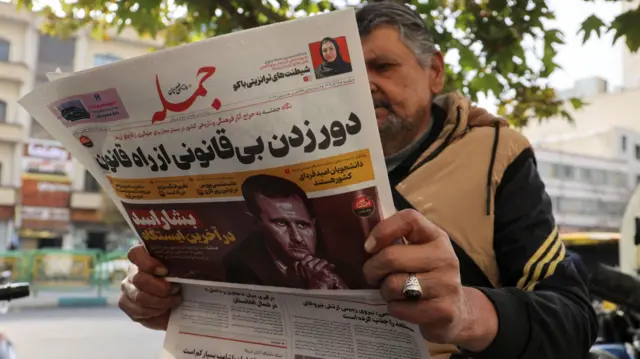 Image source, Reuters
Image source, Reuters
An Iranian man in Tehran reads a newspaper yesterday showing deposed Syrian President Bashar al-Assad on the cover
Hard-line Islamist MPs packing the Iranian parliament are angry at the speed with which the Islamic republic’s biggest investment in the region has come to nothing.
Iran supported the Assad regime throughout the civil war in Syria, with arms, troops, oil and money.
Thousands of soldiers Iran sent to Syria were killed in the battles.
Syria provided a land corridor to supply Hezbollah in Lebanon with weapons.
But for the moment Iranian officials are keeping quiet. And the top commanders of the Revolutionary Guard, are nowhere to be seen.
Iran’s supreme leader is said to be planning to speak on the subject on Wednesday.
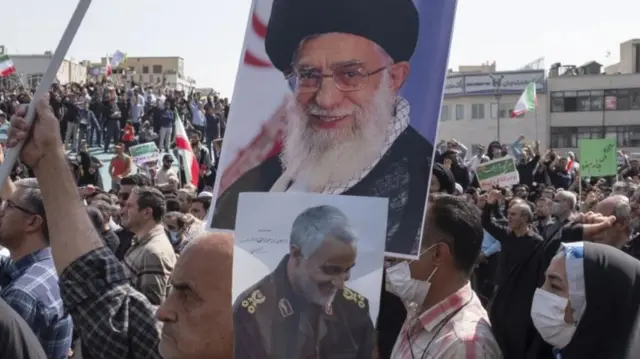 Image source, Getty Images
Image source, Getty Images
Pro-government demonstrators in Iran hold aloft a portrait of the supreme leader
Only the Foreign Minister, Abbas Araghchi, has been speaking publicly.
He says Iran was taken off-guard by how little resistance the Syrian army put up, and how fast the rebels advanced on Damascus.
“We were never meant to replace the Syrian army,” he says. But he is putting on a brave face – saying the so-called axis of resistance – the coalition of previously Iran, Syria, and armed militias in the region – will continue to fight Israel – now without Syria.
Syria was the central plank of taking the fight to Israel’s borders.
Now this policy is in shambles. Iran will have to pick itself up and think again.
Thousands of Syrians search for loved ones at Sednaya prisonpublished at 21:38 Greenwich Mean Time 9 December
Feras Kilani
BBC Arabic’s special correspondent
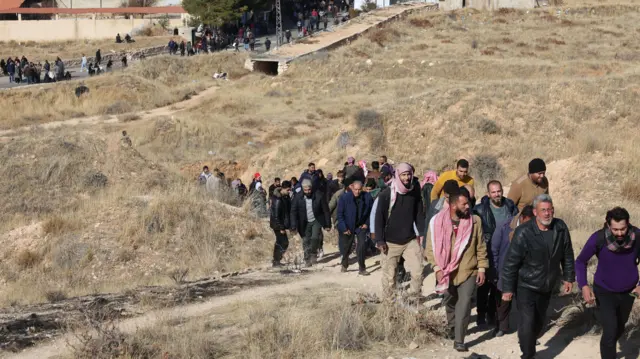 Image source, EPA
Image source, EPA
A long line of people was pictured walking towards the prison earlier today
As we’ve been reporting, thousands of Syrians are at Sednaya Prison – one of the worst prisons in the Middle East – looking for their loved ones. They don’t know if they are still alive or have been killed.
“My son, son-in-law, and my sister’s husband have been detained for around 10 years and we do not know anything,” Fatima tells me.
Some believe that there’s a secret entrance from the kitchen to some place with hidden doors, but they don’t know where this is.
Khaild, who has also came to the prison, is urging the prison guards to return and tell them how they can get the detainees out.
Amer Qassoum from the White Helmets says they cannot confirm the presence of more detainees.
“We are doing what we can, through the help of search dogs, available tools and previous detainees,” he says.
IS will try to re-establish capabilities – Blinkenpublished at 21:16 Greenwich Mean Time 9 December
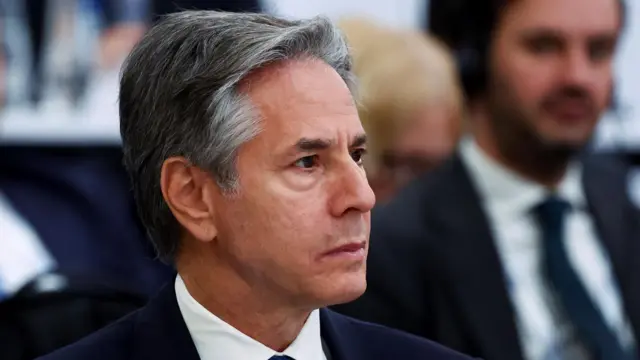 Image source, Reuters
Image source, Reuters
Let’s bring you some reaction to the latest developments in Syria from the United States’ top diplomat, Antony Blinken:
- The US Secretary of State says Bashar al-Assad being overthrown in Syria is a great opportunity but is one which “carries considerable risk” – something the United States “will not let that happen”
- The Islamic State group will try to use this period to re-establish capabilities in Syria, Blinken says
- He adds that the Syrian people have to be the ones to choose their future
- Finally, Blinken says Washington has a clear interest to avoid the “fragmentation of Syria, the export of terrorism and extremism”
In pictures: Strikes in Syriapublished at 21:07 Greenwich Mean Time 9 December
As we reported earlier, the Syrian Observatory for Human Rights, a UK-based human rights organisation, says Israel has carried out more than 100 air strikes in Syria on Monday, with a research centre suspected of links to chemical weapons production reportedly among the sites hit.
Israel says it is acting to stop such weapons falling into the hands of extremists.
The Israeli Prime Minister, Benjamin Netanyahu, says such action is necessary to ensure his country’s security.
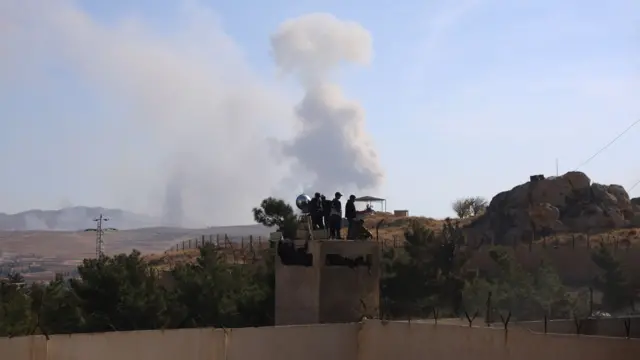 Image source, EPA-EFE/REX/Shutterstock
Image source, EPA-EFE/REX/Shutterstock
Smoke billows following an Israeli airstrike near Sednaya prison
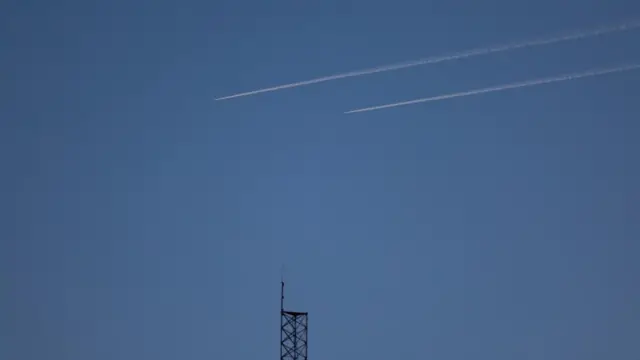 Image source, Reuters
Image source, Reuters
Israeli planes fly over Syria as seen from the Israeli-occupied Golan Heights
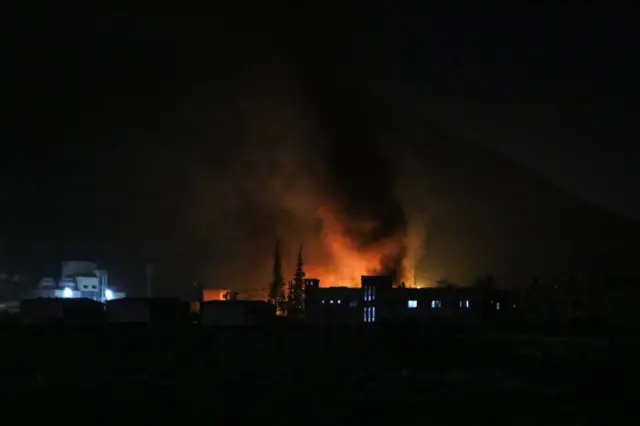 Image source, Getty Images
Image source, Getty Images
Plumes of smoke on the outskirts of the Syrian capital Damascus
Latest on the situation in the Golan Heights, as US says it is watching closelypublished at 20:54 Greenwich Mean Time 9 December
As the situation in the Middle East evolves, let’s bring you up to date with what is happening in the Golan Heights – a rocky plateau about 60km (40 miles) south-west of Damascus.
For context, Israel seized the Golan from Syria in the closing stages of the 1967 Six-Day War and unilaterally annexed it in 1981. The move was not recognised internationally, although the US did so unilaterally in 2019.
Following Bashar al-Assad’s regime being toppled, Israel moved in to the buffer zone with Prime Minister Benjamin Netanyahu saying the 1974 disengagement agreement with Syria had “collapsed” with the rebel takeover of the country.
The United Nations has described the move as a violation.
Now, US State Department spokesman Matthew Miller says Israel’s incursion must be “temporary”, adding that Washington will be watching to ensure Israel upholds the 1974 agreement.
Speaking this evening in Jerusalem, Netanyahu said the Golan Heights, occupied by Israel for almost 60 years, would remain Israeli “for eternity”.
Relatives of people imprisoned by Assad’s regime react to his downfallpublished at 20:31 Greenwich Mean Time 9 December
Some Syrians are hopeful that loved ones detained under the Bashar al-Assad regime may still be alive.
This short video shows some of the reactions we’ve been seeing from various locations in Syria including Damascus and Idlib.
Israel carries out over 100 air strikes in Syria – reportpublished at 20:19 Greenwich Mean Time 9 December
Israel has carried out more than 100 air strikes in Syria today, according to the Syrian Observatory for Human Rights, a UK-based human rights organisation.
The organisation says Israel has targeted military sites in Damascus, Daraa, Latakia and Hama – including research centres, weapons, warehouses and airports.
The organisation reported that “raids were launched on scientific research in Barzeh”.
We don’t know the specific research centre that was hit in Barzeh. But in 2017, the BBC saw a document linking a branch of the Scientific Studies and Research Centre (SSRC) in Barzeh to the production of chemical weapons.
Israeli strikes in Syria have killed 416 soldiers in 2024, the organisation adds.
Israel says it is acting to stop weapons falling into the hands of extremists.
Lebanon warns against ‘illegal crossings’ from Syriapublished at 19:50 Greenwich Mean Time 9 December
There’s a lot of uncertainty about how the future of Syria will play out after its president, Bashar al-Assad, was ousted, including questions around migration.
We’ve been hearing about hundreds of displaced Syrians returning back to the country, as well as reports that some Syrians are attempting to leave via the Masnaa border and enter Lebanon – which you can see in the photos below.
Earlier, Lebanon’s Interior Minister Judge Bassam Mawlawi warned authorities to “take immediate measures to prevent illegal crossings by Syrians”, according to Lebanese state media.
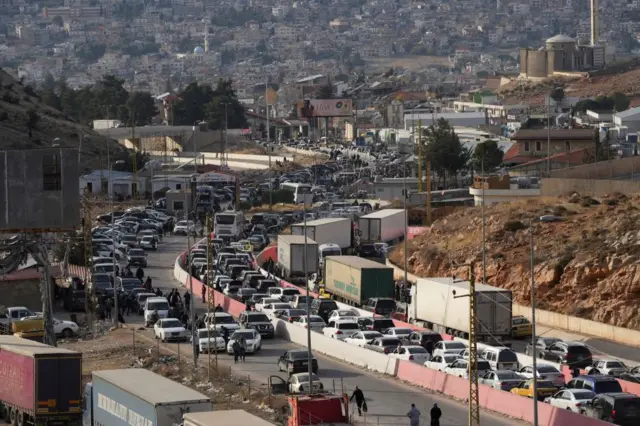 Image source, Reuters
Image source, Reuters
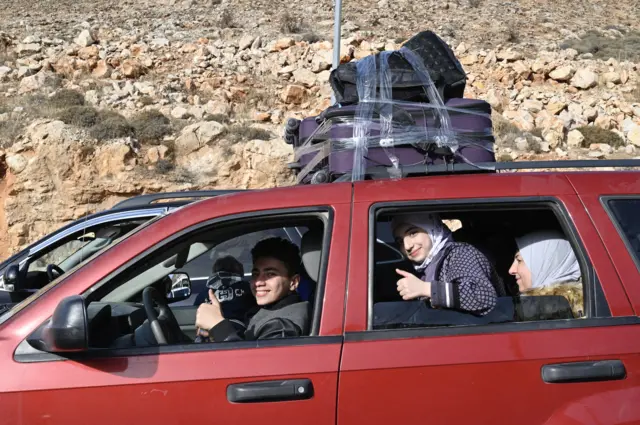 Image source, EPA-EFE/REX/Shutterstock
Image source, EPA-EFE/REX/Shutterstock
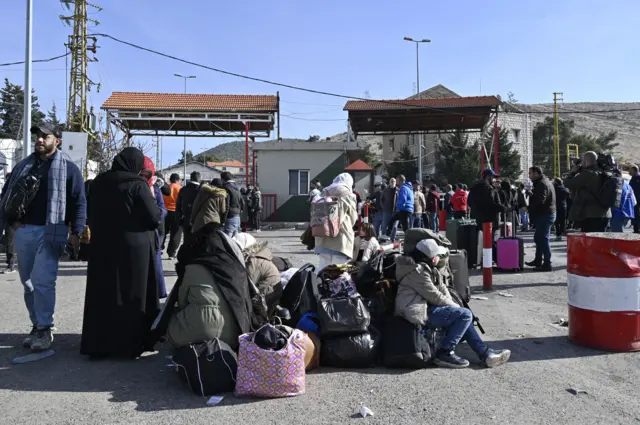 Image source, EPA-EFE/REX/Shutterstock
Image source, EPA-EFE/REX/Shutterstock
Trump will be ‘transactional’ dealing with Syria, former US diplomat sayspublished at 19:34 Greenwich Mean Time 9 December
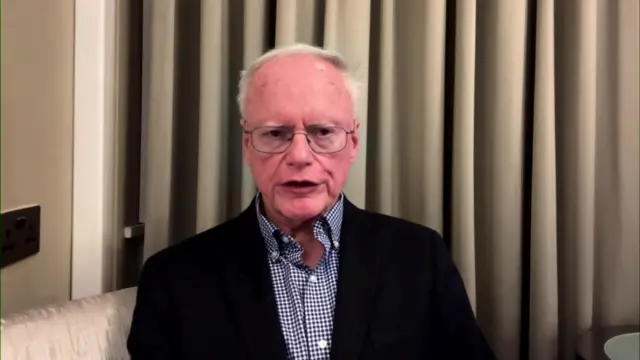
James Jeffrey, who served as the special representative for Syria Engagement under US President-elect Donald Trump’s first administration, says it’s a “great day for the Syrian people, the region and security”.
Jeffrey, also the special envoy to the US-led global coalition to defeat ISIS under Trump, says how Abu Mohammed al-Jolani leads is “still to be seen”, but the situation now in Syria is “still better than before”.
“We need an inclusive new government that brings in all the various parties,” he tells the BBC.
Asked about Trump’s approach once he become president again, Jeffrey says Trump will be “transactional”.
Three days ago Trump said he doesn’t want the US to get involved, Jeffrey explains, but what he means by that is he doesn’t want US troops in Syria, “or be on the hook for nation-building”, he says.
We will not dispense with the old regime, says al-Jolanipublished at 19:11 Greenwich Mean Time 9 December
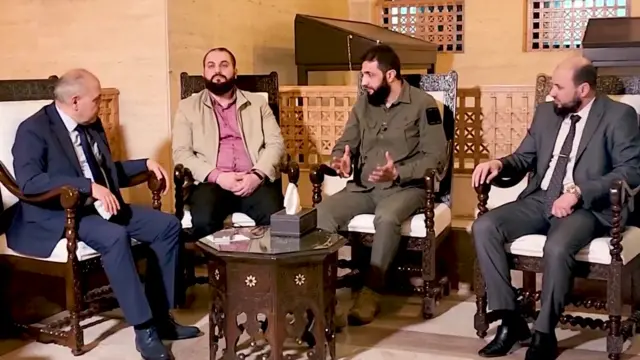
The leader of the main Islamist rebel group in Syria has met the former prime minister to co-ordinate the transfer of power.
Footage released by the rebel’s military operations command shows Abu Mohammed al-Jolani saying the transition would benefit from the experience of the old government.
“The young men have gained a lot of experience,” al-Jolani says. “They started working from nothing.
“Idlib is small and has no resources, but thank God, we were able to achieve something big during the past period. You will see experience, it’s not zero. In certain areas, they had varying high levels of success.
“However, we will not dispense the old status, it is essential that we take advantage of its existence.”
Listen: What next for Syria?published at 19:01 Greenwich Mean Time 9 December

If you’re looking for deep dive analysis on today’s developments, the latest episode of the BBC’s Newscast podcast investigates what the end of Bashar al-Assad’s regime means for Syria.
As huge crowds gather at a notorious Damascus prison looking for prisoners held under the Assad regime, Adam Fleming speaks to Lina Sinjab, the BBC’s Middle East Correspondent.
He is also joined by chief Jihadist media specialist for BBC Monitoring, Mina Al-Lami, who profiles the rebel group’s leader and legacy.
And, the Kremlin say Bashar Al-Assad has been given asylum in Moscow after fleeing from Syria.
Adam hears from the BBC’s Russia Editor Steve Rosenberg about how the fall of the Russian-supported regime is a blow to the country’s prestige.

A real-time look at the dilemmas of British foreign policypublished at 18:47 Greenwich Mean Time 9 December
Chris Mason
Political editor
Today has offered a real-time insight into the dilemmas of foreign policy.
A dictator flees, his regime collapses and the Foreign Secretary David Lammy addresses the Commons, telling MPs that Bashar al-Assad is a “monster,” a “butcher”, a “drug dealer” and a “rat”.
But, the thing is, the incoming group, known as Hayat Tahrir-al Shams (HTS), is a proscribed terrorist organisation.
So there is a dilemma – will the British government deal with them?
This morning, Cabinet Office Minister Pat McFadden – one of the most senior figures in the government – said there would be a “relatively swift decision” about that.
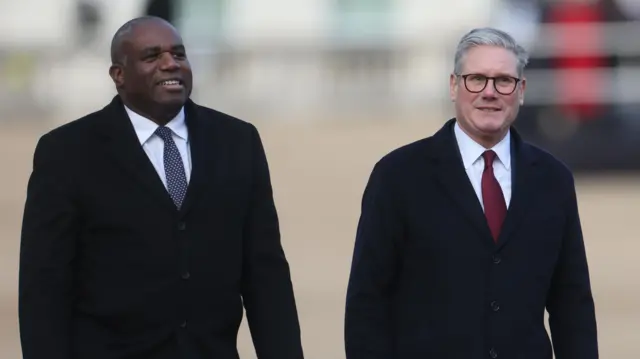 Image source, EPA
Image source, EPA
The UK’s foreign secretary (left) and prime minister (right) pictured together earlier this month
But, the prime minister and the foreign secretary speaking this afternoon have suggested the opposite.
Lammy said it was right to be “cautious” and they would judge HTS by its actions.
Sir Keir Starmer said “no decision is pending at all.”
Meanwhile, the Home Office has paused decisions on Syrian asylum claims to the UK.
It is an insight into the fluidity of the situation in Syria, the multiple implications and the difficult decisions it poses – and will continue to pose.
Saydnaya prison was like ‘hell’, says activist who fled after torturepublished at 18:39 Greenwich Mean Time 9 December
Maia Davies
BBC News
I have been speaking with Amneh Khoulani, a human rights activist who tells me she fled the country after being tortured in a Syrian prison.
Her husband and brothers were detained in Saydnaya prison, she recalls, and explains how she paid thousands of pounds to visit them.
“Visiting, it was not something legal in Syria,” she says.
“You have to pay a lot of money under the table.”
What’s more, she says, the process to get the visit included “humiliation”.
When I ask what it was like inside Saydnaya, she responds with one word: “Hell.”
 Image source, Getty Images
Image source, Getty Images
Amneh Khoulani with former first lady Melania Trump and ex-US secretary of state Mike Pompeo when she received the International Women of Courage (IWOC) Award in 2020
Her three brothers have not been seen since 2011. Assad’s forces claim they died in prison, Amneh Khoulani says, but she does not know whether to believe them.
Now, faced with the possibility of returning to Syria for the first time in more than a decade, she feels great pain.
“Every street, every town in my country, every place, every shop, everything reminds me of my brothers.”
“They don’t even have a grave,” she cries.
‘I showed everyone at the prison this photo… but nobody recognised him’published at 18:28 Greenwich Mean Time 9 December
Gabriela Pomeroy
Live reporter
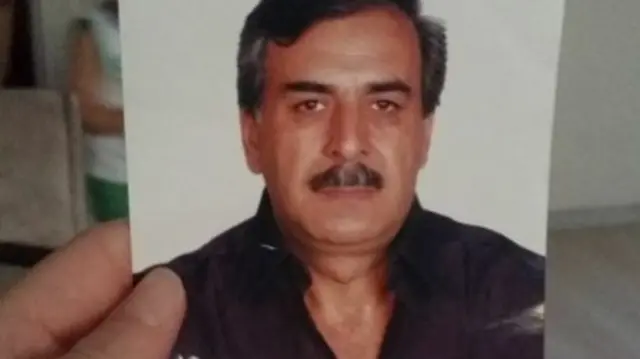 Image source, Jwan Omar
Image source, Jwan Omar
Mohammed Abdul Samad Khalil disappeared in 2013. His family still hope they can find him now that the Assad regime is gone
I’ve been talking to Jwan Omar – a Syrian living in Turkey – who went to Saydnaya prison last night to search for his father-in-law who disappeared in 2013.
“I went to the prison and showed photos of my father-in-law and asked if anyone had seen him. There were thousands of other people also carrying photos.”
Omar’s father-in-law Mohammed Abdul Samad Khalil was arrested in Aleppo by the regime – accused of helping the opposition Free Syrian Army.
“When we heard the Assad regime was gone we had new hope,” Omar says, and he drove for five hours from his home in Turkey to the prison in Damascus.
“But I didn’t find him and my wife has been crying since yesterday,” he says.
Quote Message
For years we didn’t know if my father-in-law was dead or alive.”
Omar
But in 2020 he received information from a Syrian army officer that Khalil was seen alive in Saydnaya prison.
“Many prisoners did find their families in the past few days,” he says, “but unfortunately not us”.
Taliban supporters in Afghanistan distribute sweets to celebrate fall of Assadpublished at 18:22 Greenwich Mean Time 9 December
Hafizullah Maroof
BBC Afghan Service
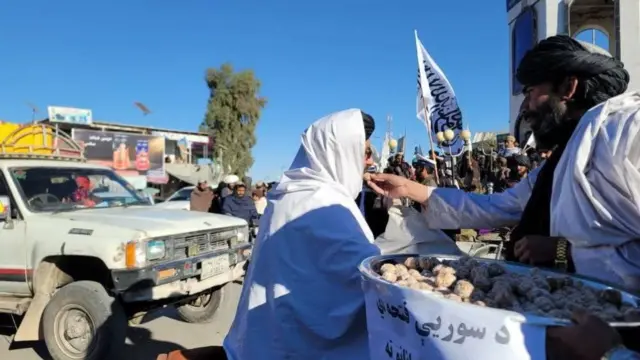
The Taliban government in Afghanistan was one of the first in the world to react to the developments in Syria, congratulating the rebels and expressing hope for “Islamic government” in the country.
Taliban supporters and some of their allies were also distributing sweets in gatherings in many provinces to cheers Assad’s removal from power.
The Taliban are followers of extreme Sunni thought and jihadists. Their “ideological connections” are one of the reasons the Taliban have immense sympathy for jihadist rebels in Syria.
A senior Taliban official, working in the presidential office, wrote on his X account “the story of Kabul and Damascus is the same, both fallen on Sunday, both captured in 11 days and leaders of both countries fled”.
Glasgow-based Syrians thrilled and looking forward to reuniting with familypublished at 18:14 Greenwich Mean Time 9 December
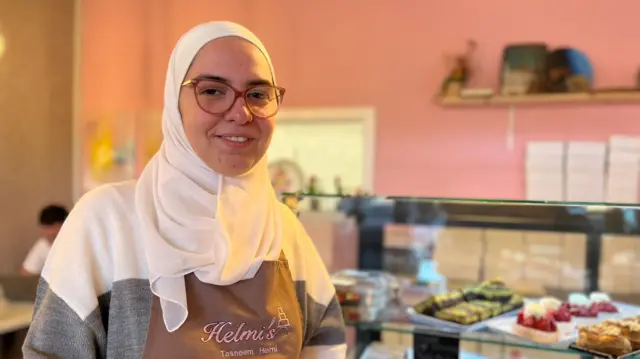
Tasneem Helmi and her husband fled Syria and now run bakeries and patisseries in Scotland
Tasneem Helmi and her husband Mohamed fled war-torn Syria and ended up running a bakery and patisserie in Rothesay on the Isle of Bute in Scotland.
They have since expanded their business and now have outlets in Glasgow and Bearsden.
Tasneem tells BBC Radio Scotland’s Drivetime that her family was very “happy”, thrilled and also have “mixed feelings about the unknown future”.
Quote Message
We’ll go back and visit and see the family that we miss a lot, that we’ve not seen in 13 years.”
Tasneem
“A lot of children that we’ve never seen, just photos of them, we’re looking forward to being able to go there and see the family and reunite,” Tasneem adds.
Turkey to reopen border gate with Syria – Erdoganpublished at 18:04 Greenwich Mean Time 9 December
Turkey is reopening a border gate with Syria to aid the voluntary return of millions of Syrian migrants, President Tayyip Erdogan says.
The Yayladagi border gate in the Hatay province of Turkey is a crossing on the westerly edge of the border between the two countries.
There are upwards of three million Syrian refugees in Turkey, according to the UN.
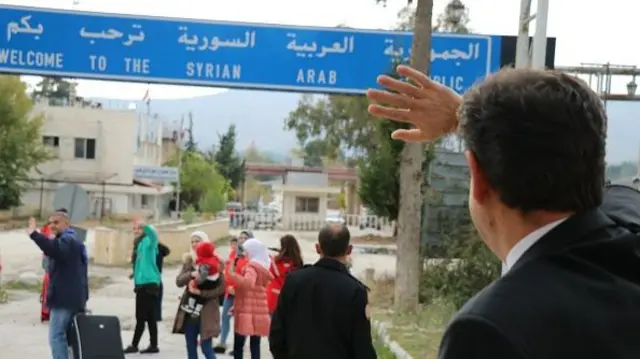 Image source, Getty Images
Image source, Getty Images
The Yayladagi border gate pictured in 2018
Crowds outside Saydnaya prison as search for the missing continuespublished at 17:56 Greenwich Mean Time 9 December
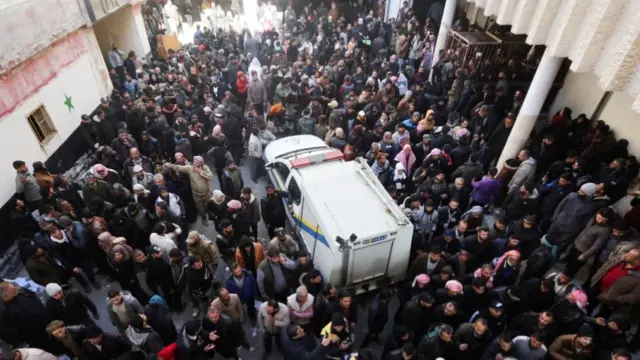 Image source, Reuters
Image source, Reuters
As we’ve been reporting, large crowds have been gathering outside the notorious Saydnaya prison in Damascus, hoping to find information about missing loved ones.
Investigators are frantically searching for hidden cells after reports said prisoners could be trapped there, though a campaign group has said all detainees have already been freed from the facility.
Thousands of people are said to have been tortured and executed in the prison, which has come to represent the worst of the now-toppled Assad regime.
Here are some of the latest pictures we’ve seen from outside the prison.
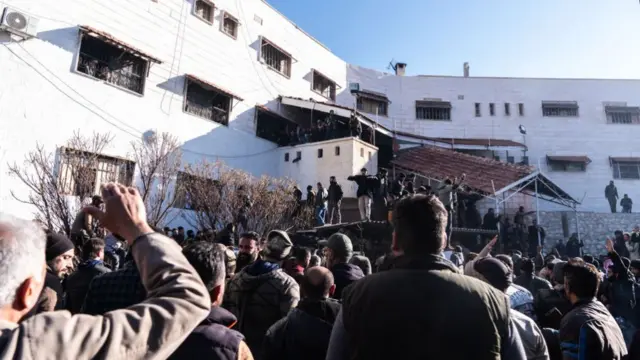 Image source, Getty Images
Image source, Getty Images
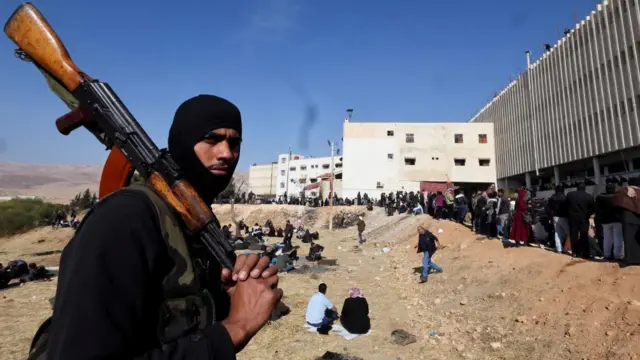 Image source, Reuters
Image source, Reuters
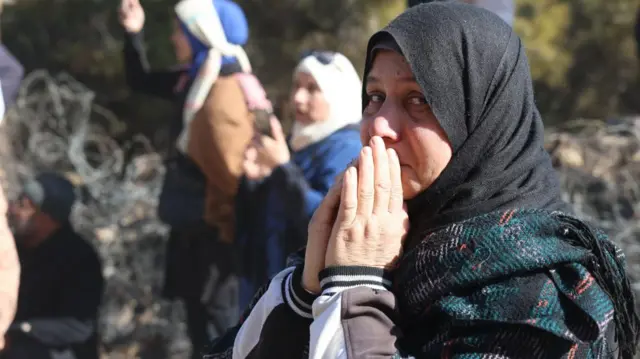 Image source, EPA
Image source, EPA
UK pauses asylum decisions on cases from Syriapublished at 17:46 Greenwich Mean Time 9 December
Breaking
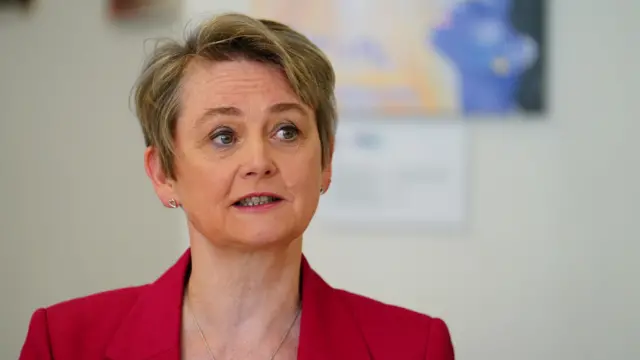 Image source, PA Media
Image source, PA Media
The UK’s Home Secretary Yvette Cooper says the UK has “paused asylum decisions on cases from Syria while the Home Office reviews and monitors the current situation”.
She says the situation in the country is “moving extremely fast after the fall of the Assad regime” and adds that some people are returning to Syria.
She says the government will “closely monitor” developments there.
It comes after some other European counties, including Germany, France, Austria and the Nordic states pause pending asylum requests from Syrians – see our post below.
European countries freeze Syrian asylum requestspublished at 17:38 Greenwich Mean Time 9 December
Turning our attention to comments from elsewhere in Europe now: Germany, France, Austria and the Nordic states are among several countries that have paused all pending asylum requests from Syrians.
Berlin and other governments have said they were watching the rapid developments in Damascus, but Austria has signalled it will soon deport refugees back to Syria, a day after President Bashar al-Assad was deposed by Syrian rebels.
Sweden, Denmark and Norway also said on Monday they were suspending the examination of asylum applications from Syrian refugees.
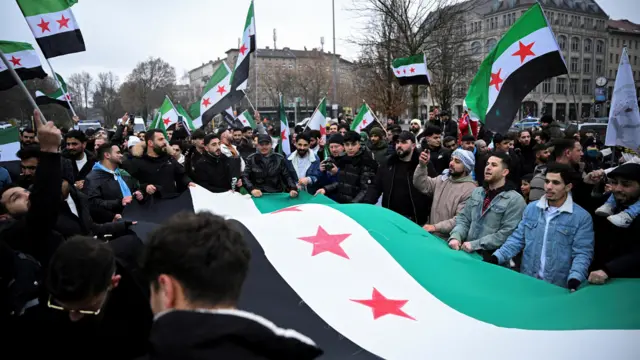 Image source, Reuters
Image source, Reuters
Supporters of Syria’s opposition celebrated in Berlin at the weekend as news of Bashar al-Assad’s ousting broke
The civil war forced millions of Syrians to flee the country. They were a large proportion of the more than a million people who made their way to Germany and neighbouring Austria during the European migration crisis of 2015 and 2016.
Germany has taken in almost one million Syrians, with the bulk arriving in 2015-16 under the country’s former Chancellor Angela Merkel.
Interior Minister Nancy Faeser has said many Syrian refugees “now finally have hope of returning to their Syrian homeland” but cautions that “the situation in Syria is currently very unclear”.
